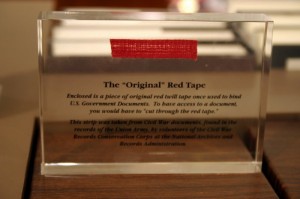 When I was learning to speak Romanian, I was curious about the origin of certain expressions and phrases. Sometimes, Romanians could tell me where the expression came from. Other times, they couldn’t.
When I was learning to speak Romanian, I was curious about the origin of certain expressions and phrases. Sometimes, Romanians could tell me where the expression came from. Other times, they couldn’t.
In case you ever wonder why we say what we say, here are the stories behind ten common English expressions:
Red Tape
Origin: 16th century
Story: Henry VIII sent 80 petitions to Pope Clement VII asking for his marriage to Catherine of Aragon to be annulled. The petitions are bound with red tape. The expression was popularized after the Civil War, when veterans’ records were bound in red tape and were difficult to access.
OKAY
Origin: 19th century
Story: The initials O.K. once stood for “Oll Korrect”. But the phrase became popularized in the 1840 U.S. presidential election when the Democrats claimed that OK stood for “Old Kinderhook” – the nickname for candidate Martin Van Buren of Kinderhook, NY. “Vote for OK” became a slogan and the word “okay” eventually spread across the world.
Raining cats and dogs
Origin: 17th century
Story: Some speculate that this phrase arose in the 17th century as a result of poor drainage systems in Europe. During heavy showers, drains disgorged their contents of any animal corpses that may have accumulated. This occurrence is documented in Johnathan Swift’s 1710 poem ‘Description of a City Shower’, in which he describes “Drowned puppies, stinking sprats, all drenched in mud,/Dead cats and turnip-tops come tumbling down the flood.”
A Little Bird Told Me
Origin: Biblical
Story: The root source of this expression is from Ecclesiastes 10:20 (KJV) “Curse not the king, no not in thy thought; and curse not the rich in thy bedchamber: for a bird of the air shall carry the voice, and that which hath wings shall tell the matter.” Various authors over the centuries, including Shakespeare, have made reference to birds giving messages. The phrase was popularized as a song by Harvey Brooks in 1947.
Beat around the Bush
Origin: 18th century
Story: This phrase originated within the world of boar hunting. Noblemen once hired workers to walk through the woods and beat the branches. By making noises, the workers caused animals to run toward the hunters. Since boars are dangerous animals, unarmed workers avoided the dense undergrowth where boars could typically be found. So they beat around it rather than going into it. This evasive technique was termed “beating around the bush.”
Red Letter Day
Origin: Middle Ages
Story: Medieval church calenders were illuminated manuscripts with highlighted words in red ink. In the first edition of the Book of Common Prayer (1549), holy days were noted with red ink. The phrase now refers to any special day or day of personal significance.
Bigwig
Origin: 17th Century
Story: Wigs came into fashion in the 17th century and eventually were used by almost all European nobility. Ostentatious displays of nobility became popular through the use of bigger and bigger wigs. The title “bigwig” now refers to someone rich and powerful.
Blockbuster
Origin: World War II
Story: “Blockbuster” was the name given to large conventional bombs used in World War II which had enough power to destroy a city block. Now, the term refers to a successful production in the film industry.
Pipe Dream
Origin: 19th century
Story: A “pipe dream” originally referred to the dreams experienced by the smokers of opium pipes. Today, it refers to a fantastic hope or plan that is impossible to achieve.
Face the Music
Origin: 1830’s – 1850’s
Story: In musical theater, a nervous or inexperienced performer must summon up all his courage to face the audience as well as the musicians in the orchestra pit. The phrase is now used to refer to the need for one to face the consequences of their decisions.


















